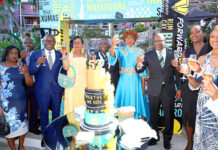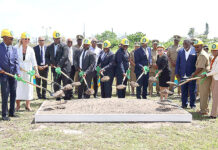
ADDRESS by SEN. THE HON. ALLYSON MAYNARD GIBSON Q.C.
ATTORNEY-GENERAL AND MINISTER OF LEGAL AFFAIRS
TO THE GRADUATES
HUGH WOODING LAW SCHOOL
PORT OF SPAIN, TRINIDAD
SATURDAY 3RD OCTOBER, 2015
GREETINGS AND SALUTATIONS
It is an honour and great pleasure to be here this afternoon and to join with your professors, lecturers, tutors, advisors, family and friends as we celebrate and honour the Region’s newest lawyers. I congratulate all of you and thank all who have supported you to this important day in your lives. Your certificates equally belong to your parents and significant others who have supported you on this journey.
I am especially honoured to participate in this occasion. I am the Granddaughter of 2 of the members of the Maverick Club formed in 1919 in Port of Spain, Trinidad by C.L.R. James. I have a picture of the 1919 members. In that picture are my Grandparents and 3 of my Grand Aunts (including Auntie Kay who is well known to Trinidadians of my generation). They were close friends of Sir Hugh Wooding and our families have been connected for generations. May I also acknowledge my cousins Madam Justice Judith Jones and former Justice of Appeal James Davis, shoots of the same root.
About 35 years ago I was in your position: excited, relieved, scared and bursting with pride! I assure you that you are about to commence a learned profession that is one of the most exciting, if not THE most exciting profession in the world!
Graduates frequently tell me that they care about “jobs and money” and that in 10 years they want to be “well-known and very successful”. For some this translates to “I want to be rich”.
Savour today’s enthusiasm and take it with you every day for the rest of your life. I’d like you to remember that the tripod upon which success as a lawyer stands comprises 3 words: learn; return; and earn.
To become a “well known and successful lawyer”, you must daily work hard in pursuit of excellence. Word will spread of your reputation for excellence. There will be such demand for your services that you will earn. But note, success comes from reputation, which can’t be bought. You will gain satisfaction, knowledge, and so much more [which also can’t be bought] from giving back or returning.
Sir Lynden Pindling, the first Prime Minister of an Independent Bahamas, when he was called to The Bar in 1953 quoted his former tutor, saying, “These are the days when the need for men of sterling worth is greatest. When I was a young man, a lawyer was essentially a defender of criminals, or a draughtsman of wills: but today the lawyer’s task is greater. He must reach forward out of the realm of pure law and delve into the life of this community, he must unravel the mysteries of unrest and dissention and assist in the promotion of a good life for his fellow citizens, the good life that Aristotle, the cream of Greek philosophers, so valiantly sought. All of you can help fill that need: some of you must.” Sir Lynden then said, “My Lord as I have vowed to uphold the principles of this noble profession, so do I dedicate myself to the service of this land, this colony, this people, this community.” [Sir Lynden Pindling on his call to the Bar July 11 1953] Sir Lynden is one of the Founding Regionalism.
The words of Sir Lynden and his tutor are as important today as they were in 1953, “…the lawyer’s task is greater”.
You are entering practice at an extremely exciting time – of change – the Information and Communication Technology (“ICT”) era. This means that your options, duties and responsibilities are limitless.
Notwithstanding rapid change, there are some principles/rules that are timeless. I urge you to consider some of them.
Integrity. Integrity is the first rule for lawyers. Always remember that money in your client account belongs to your client, not you. And, ensure that the Court and everyone in your community can say of you that you are “…of sterling worth…” or can be trusted. This takes time. The time taken to assure your good reputation reaps endless rewards.
Always carry yourself or conduct yourself like a member of this learned profession … the law. The only place where “success” comes before “work” is the dictionary. People expect much from lawyers. ALWAYS do your best. No matter how simple something may seem, give it your best. When matters appear to be very simple they usually contain complexity that can only unraveled though humility and hard work.
Never stop learning. Choose an area of law that you enjoy recognizing that law touches every aspect of “life”. So, you may practice in other areas of the law during your career. Have an UNQUENCHABLE thirst for knowledge – “…the lawyer’s task is greater”.
Even the traditional areas of law have evolved in the ICT era. 30 years ago, Criminal law would have primarily encompassed murder, theft, rape and similar crime. Today, criminal law encompasses cross border offences like human smuggling, trafficking in persons, and cyberspace offences.
Wills and other legal documents are now available online in prepackaged software.
Family law is no longer “traditional”. Existing laws in some jurisdictions have placed them in the position where 2 parents could ask a surrogate mother to carry a child conceived the result of donated egg and donated sperm. Lawyers will be challenged as each of them asserts rights in respect of the child?
Financial services, seen by many countries in the Region as a sector with tremendous potential for expansion, is being redefined. As most countries in the Region emerge from the adverse impact of the Global Recession, banks are consolidating services, closing branches and promoting online business. Online business brings new legal challenges in an ICT world. I foreshadow that Caribbean region banks over the short to medium term will be reconsidering their correspondent banking relationships. For decades Regional correspondent banking has been conducted through the U.S.A. I believe that we will see China grow as a choice for correspondent banking. Some countries in the Region have become dollarized economies i.e. that the U.S. dollar is the official currency. Surely we can imagine a day when countries may decide to become “Chinese Yuan Renminbiized”. And, many countries may decide to link their currency to one or other currency. Securities law, online gaming law, regulatory law and focus on combatting money laundering and terrorism financing will require your attention. Consider the importance of CFATF, headquartered in Trinidad which, next month will take the Chair of CFATF. The first female and I believe only female to Co-Chair an FATF Committee is from Trinidad, Ms. Dawne Spicer.
Of course being a Region primarily of Island States, Maritime law is increasing in importance. Maritime law and any other specialty involving international trade or treaties present untold opportunities in international arbitration.
The Bahamas’ Prime Minister has just demitted the Chair of CARICOM. He and other CARICOM Prime Ministers are deeply concerned about the impact of climate change. Environmental law is front and centre on national and international agendas.
The era of ICTs and adherence to international conventions continues to redefine Constitutional law. Thirty years ago access by a disabled person to a building, or a matter involving the rights of and to children would have been domestic matters. Today lawyers must reference UN Conventions and decisions from other jurisdictions.
The Region needs people who understand and speak the language of international law. You are graduating at a time when you will probably need to know how to draft petitions for the Inter-American Commission or Court of Human Rights; the International Court of Justice (ICJ), the Dispute Settlement Panel of the World Trade Organization (WTO), or the International Tribunal for the Law of the Sea (ITLOS) and regionally, the Caribbean Court of Justice. Some of you may eventually sit as a member of that eminent court.
In the arena of rapid change, I see the formation of Regional Law Firms. Many US based law firms have offices in major or strategic world trading centres. Look around you at your colleagues from other jurisdictions. Could they be your partner in a Regional law firm? This issue will be on your doorstep sooner rather than later. As I speak, lawyers from other parts of the world are lobbying national Bar Councils and Governments to have rights of audience in national Courts.
You are coming into the profession at an exciting time – one involving tremendous change – change in how we practice within law firms (led by the use of technology); change in the Courts’ processes (led by technology and the awareness of the value of judicial time, a treasured and limited commodity); increasing focus on international order/norms rather than domestic order/norms (examples are routine reference to various UN Conventions and regimes of international organizations such as FATF and CFATF, WTO and EPA); and in the Region, continued development of Caricom and the CCJ.
And, especially as the Caribbean is underrepresented in these organizations, a part of your career may be spent working in one of them. Never stop learning.
Consider whether for you law will be a business. Professor Richard Susskind has written extensively about the “End of Lawyers”. In the ICT era lawyers are outsourcing support services. Some feel that these are best provided by businesses led or owned by lawyers. You may be the owner of, or shareholder in, such an enterprise, which again, may be a Regional enterprise.
Give back to your community. Return. Last week when His Holiness Pope Francis addressed the joint session of Congress he said that members are “…called to defend and preserve the dignity of your fellow citizens in the tireless and demanding pursuit of the common good…”. These words apply equally to you.
Sir Hugh Wooding when speaking at the ceremonial opening of the Legal Year in 1963 said, “To my mind, the intent and meaning of the Law is precisely that of disciplined endeavour in the cause of social justice. What do we do about it? Do we merely practice our profession or do we set about informing ourselves of the law’s inadequacies so that, armed with knowledge, we may give an impetus to social reform? Put another way, I would phrase it in this wise – that our purpose should not be limited administering the laws justly but should extend to seeing that the laws are just.”
Your legacy will be built from the last leg of the tripod – “return” – giving back to your community.
Promote efficiency in the administration of justice. Today, for Ministers of Justice, at least 2 things were clear, [1] small States are challenged by efficiency in administration of justice and [2] well developed States are challenged by efficiency in the administration of justice. For ALL STATES, efficiency in the administration of justice means that the status quo cannot remain the same. The world is connected in real time. Time is money. Efficiency is the watch word. Judicial time is valuable. As an advocate, you can gain admiration and respect for clarity and brevity. 35 years ago, people used to say in jest that “lawyers get paid by the word”. Today, clients and Judges want you to communicate clearly, in words that everyone can understand and, without prejudicing your client, to be as brief as possible.
Efficiency also means that you will complete the “e” movement in the administration of justice – including use of digital files and videoconferencing in courts and offices. Case management by videoconferencing is today’s reality.
I return to matter enunciated by the young lawyers with whom I spoke – “I want to be a well-known and very successful lawyer”. Please read about the life of Sir Hugh Wooding, National Hero. He unceasingly gave to Trinidad and Tobago and the Region. This is the “return” leg of the tripod of success. Please, give as much as you can as often as you can to developing “the Law” and a just society. “Justice” as exhorted by Sir Hugh Wooding and countless others is a spiritual concept. It will be attained as you unceasingly ask the One higher than us all to give you “wisdom”. Your broad shoulders are there for others to stand on.
Madame Chair has every reason to be proud. Regional leaders know that in the hands of these graduates the future is bright.
I pray that God will richly bless your lives and your careers.







